
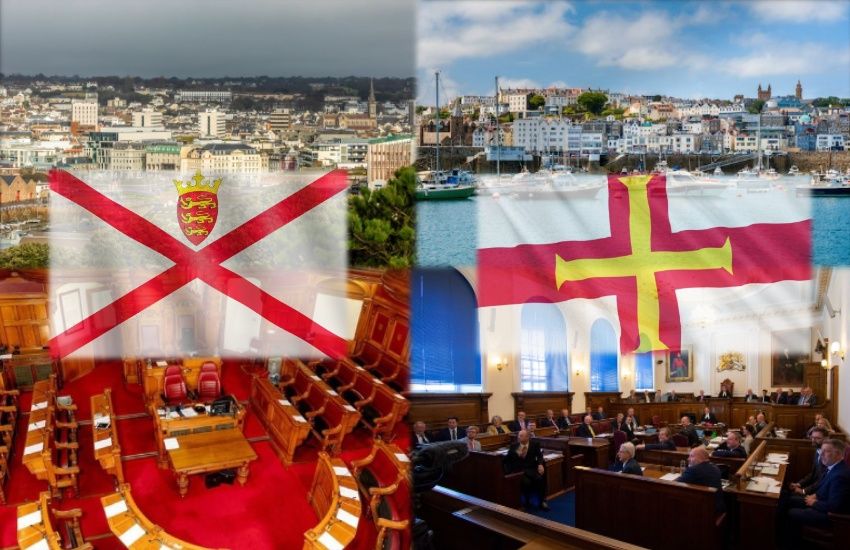

Senior politicians and officials in Jersey and Guernsey have often spoken ambitiously about opportunities for collaboration to save money and improve services over the past decade…but how far has the rhetoric matched the reality?
Express looks back on the key moments of unity and rivalry between the islands over the past 10 years...
In 2012, Deputy Anne Pryke, then Jersey's Health Minister, said: “If there are any ways we can save money by looking at projects together, this would make sense."
This followed a meeting between officials of both islands at which opportunities for joint working were discussed - in particular, in relation to patients' records and procurement of medical goods and services.
Four years later, this ambition was reaffirmed by Jersey's then Chief Minister, Senator Ian Gorst, who called for “closer collaboration in public health” throughout the Channel Islands.
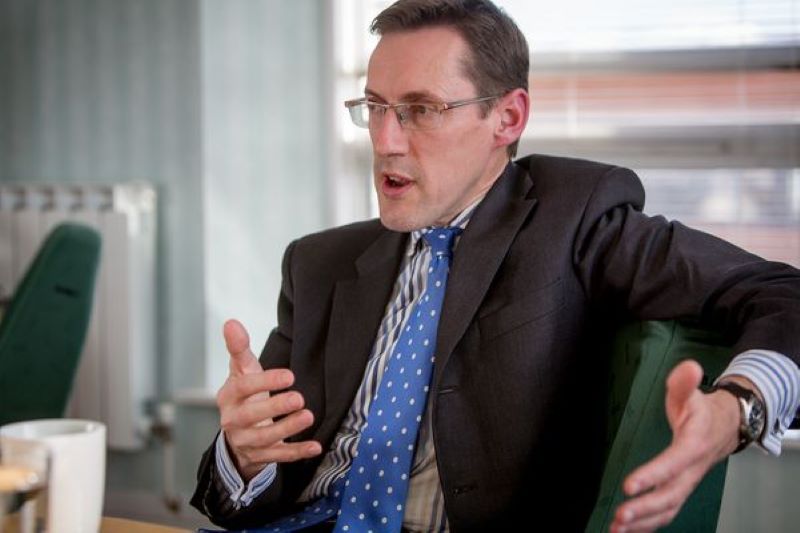
Pictured: Senator Ian Gorst was Jersey's Chief Minister between 2011 and 2018 and is currently Minister for External Relations.
Speaking to Guernsey's Institute of Directors, Senator Gorst said that, despite some distinctions between the islands' health services, “officers have also identified a number of areas where joint training and knowledge-sharing could reduce the cost and increase the pace of change...the best is definitely yet to come."
Senator Gorst reiterated what Deputy Pryke had wished for four years previously - that there are untapped benefits in joint working, such as in procuring goods and services and encouraging healthy lifestyles, which could benefit the islands' people and the States' finances.
“If we work together, we can influence more effectively, have more credibility on the international stage, cover more ground, and use our resources more cost-effectively,” said Senator Gorst.
Another two years passed before the two islands' States developed any concrete plans for joint working on health and social care.
In June 2018, a Channel Islands' Political Oversight Board was established with a pledge to “work together to share expertise and deliver high-quality services to islanders".

Pictured: The first meeting of the new Oversight Board, which involved Jersey and Guernsey's Chief Executives as well as their Chief Ministers.
The Oversight Board was chaired jointly by Jersey's Chief Minister, Senator John Le Fondre, and Guernsey's, Deputy Gavin St. Pier.
Membership of the Oversight Board included various senior politicians and officials from both islands, including the Chief Executives of Jersey, Guernsey and Alderney.
Amongst them was Senator Gorst, now the External Relations Minister, and Guernsey's former Health President, Deputy Heidi Soulsby.
An initial meeting established priorities where the islands' governments felt that progress could be made within a year:
joint working on policy development, including through joint commissioning of external experts, secondments of policy officials between islands, joint teams, joint island community engagement, joint performance measures and the potential for a joint graduate programme with placements in both islands;
introducing a shadow Channel Islands' Health Authority to promote joint working in health and care, including joint procurement of IT and other operational services, professional liaison, recruitment, shared learning and education, to support improvements to the provision of health and care services in both communities;
setting up a joint digital transformation board to work together on the delivery of technology to speed up online services for islanders;
a formal partnership for public sector procurement, including contract and supplier management, to improve value for money and reduce costs; and
and commitment to sharing data and analytics.
Following this meeting in 2018, it was acknowledged that previous attempts at Guernsey-Jersey collaboration had “generally foundered”, but it was also claimed that there was now progress “on areas such as inter-island sea links, Brexit and external relations, cyber-security and civil aviation".
Senator Le Fondré said: “This new initiative is different, as it is setting specific targets against both islands' government business plans, financial plans and transformation programmes. It is not only championed by both Chief Ministers, but also has the full commitment of our public service leaders.”

Pictured: When the Channel Islands' Political Oversight Board was set up in 2018, IT, training and community engagement were among the first areas of work identified as ripe for joint working.
In Guernsey, Deputy St. Pier said: “Today's meeting has helped us raise our ambitions - not just to focus on quick wins, but to transform the way that we work in order to make public services better and to reduce the cost of providing those services.”
The next meeting of the Oversight Board occurred six months later. A memorandum of understanding was signed between Guernsey and Jersey which committed them to working together where possible on common healthcare challenges.
Whilst not a legally-binding document, the memorandum of understanding directed joint working within health services through sharing expertise and clinical resources, purchasing, recruitment and education – especially for nursing.
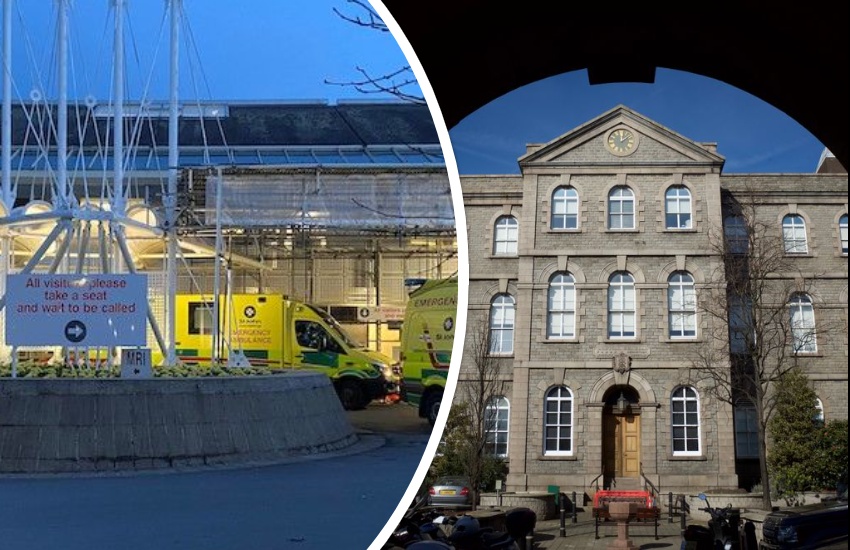
Pictured: Six years after Jersey's then Health Minister talked enthusiastically about Guernsey and Jersey working together on health and social care, a memorandum of understanding was signed in an effort to commit the two islands' States to greater collaboration.
The next update from the Oversight Board was provided in March 2019.
A meeting was held to discuss Brexit, 5G technology, criminal justice and the marine environment.
Jersey's leaders claimed that the “two health authorities are already working together on procurement and resource management, regulation and professional liaison and mutual support".
"This has involved visits from the Chief Nurses, Medical Directors, safeguarding teams, digital teams, procurement teams, hospital modernisation teams and public health teams," they said.
Senator Le Fondré and Deputy St. Pier were upbeat about the health partnership. They said that joint working was helping to establish strong working relationships which should ideally be replicated across other public services areas.
In December 2019, the Oversight Board held a phone conference where the focus was recorded as having shifted from working across a broad range of issues to specific areas: namely, justice, healthcare, policy development and performance reporting.
In healthcare, it was claimed that work was underway to establish single statutory posts across each island and that joint working was bearing fruit through common regulations, sharing capability and capacity, such as in orthopaedic care, and aligning the islands' transformation programmes.
In justice, collaboration between the islands’ prison services was mentioned - specifically through sharing training resources and the procurement of equipment. It was reported that work was underway to share more information between the islands' law enforcement authorities.
Guernsey's former Home Affairs President Deputy Mary Lowe had previously mooted moving inmates between the islands for administrative purposes and to help ease populations at both Les Nicolles and La Moye prisons back in 2018. In June 2019, it emerged that Jersey was working on drawing up legislation to allow for this.
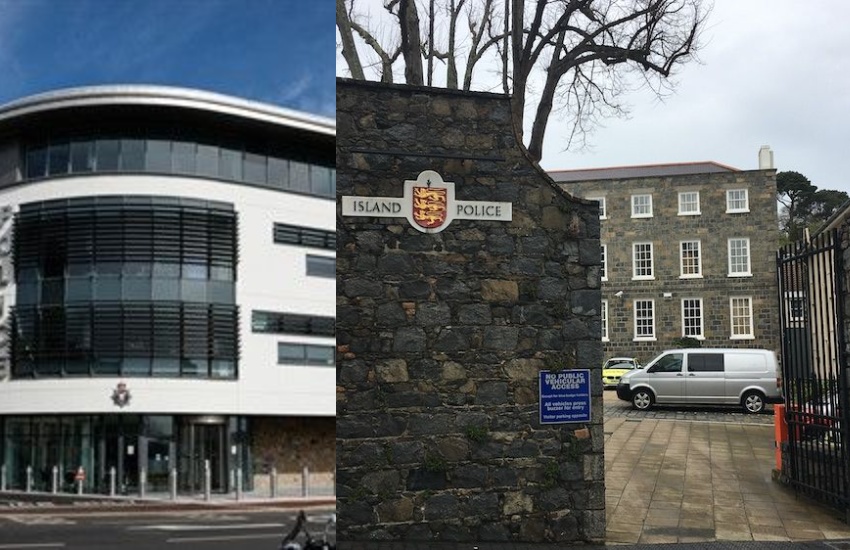
Pictured: In 2019, sharing resources in law and order was floated as a potential area for Guernsey-Jersey joint working.
Following the meeting at the end of 2019, climate change was also highlighted as an area of opportunity for the islands to work together more.
Jersey's leaders said: “Performance reporting and management tools... are being shared in order to enable comparison between both jurisdictions that identifies best practice and successful outcomes.”
Since that meeting in December 2019, the two islands have said little about working together - though this has coincided with the arrival in the islands of covid-19 in March 2020.
Despite there being a joint Channel Islands pandemic preparedness strategy, the two islands ended up taking distinctly different approaches to the management of covid-19.
Having worked on a joint pandemic strategy, the two islands took separate approaches to the management of covid-19, with Deputy Peter Ferbrache - who later became the island's Chief Minister - making critical comments about Jersey’s decision-making while still a backbencher in 2020.
Chief Minister Senator John Le Fondré hit back at the remarks at the time as “emotional and ill-informed”. Months later he said managing the pandemic was "not a competition".
Video: Senator Le Fondré responding to criticism from Guernsey over the island's handling of the pandemic.
But tensions weren't only present on the topic of pandemic management - in April 2020, disagreement over how pan-island competition watchdog CICRA should be run led Jersey’s Government to “terminate” its operations and set up its own single-island authority, the JCRA.
Now a backbencher following Guernsey's 2020 election, Deputy St. Pier in November of that year called for a joint head of the Channel Islands’ public services after Jersey’s Chief Executive Charlie Parker stepped down in the wake of his second job scandal.
"Clearly, if the islands are serious about the two public services working more closely together and obtaining the synergies of doing so, then now would be the ideal opportunity to be looking very seriously as to how that could be achieved with some kind of joint leadership role,” said Deputy St. Pier.
With a vacancy having opened up at the head of Jersey’s public service, now is the perfect time for both islands to jointly appoint an individual to drive the two public services together.
— Gavin St Pier ???????? (@gavinstpier) November 11, 2020
To not lose/take advantage of the opportunity will need determined political leadership.
Deputy St. Pier's suggestion was not taken up. This month, Suzanne Wylie started her new job - as the States of Jersey's Chief Executive.
In Guernsey, the States are thought to be close to starting the process of advertising for a new Chief Executive as Mark De Garis approaches six months as interim Chief Executive.
The most recent example of the islands (lack of) collaboration came last month, when it emerged that Guernsey didn't tell Jersey it was planning to purchase a ferry for Condor.
This was despite the two islands apparently "working closely" on improving sea links in recent months.

Pictured: Guernsey's Chief Minister (right) did not tell Jersey's Government of his intention for the island to purchase a ferry for Condor.
Jersey's Economic Development Minister, Senator Lyndon Farnham (pictured above, left), described the plan - which is yet to come to fruition - as "unexpected".
The proposal, alongside easing covid-19 restrictions, did, however, appear to prompt the first in-person meeting in more than two years between the islands' leading figures.
On the agenda were a "range of issues", which were not detailed, "including sea transport links".
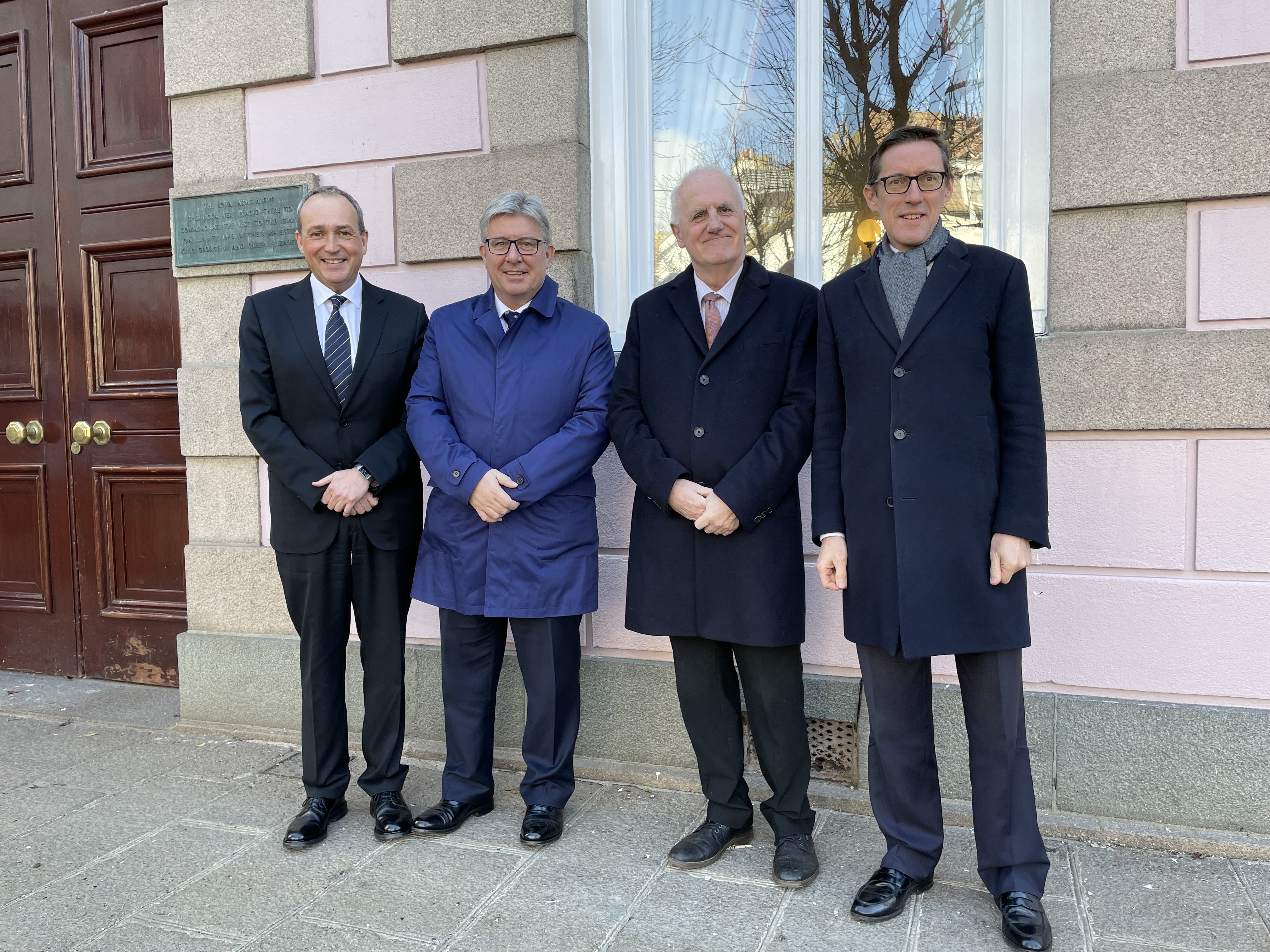
Pictured: Senator Farnham, Deputy Helyar, Deputy Ferbrache and Senator Gorst after the meeting, which Senator Le Fondré had to attend via Teams.
Having tested positive for covid, Jersey's Chief Minister was unable to attend personally, so dialled in via Teams.
It has long been the aspiration of Jersey's Health Department to provide radiotherapy locally but the relatively small number of islanders who need this treatment is a significant barrier to make it clinically and economically sustainable.
Around 150 people a year travel to the UK for treatment, according to the latest figures, which draw on 2018/19 data.
One long-standing option has been to collaborate with Guernsey to ensure the provision is clinically and economically viable.
A business case is currently being drawn up to thoroughly explore the possibility on-island radiotherapy in depth. However, Jersey's Health Minister said it would not be exclusively based on pan-island cooperation - indeed, he told a panel of Scrutineers in November that he had not discussed the matter with his Guernsey counterpart.
Comments
Comments on this story express the views of the commentator only, not Bailiwick Publishing. We are unable to guarantee the accuracy of any of those comments.